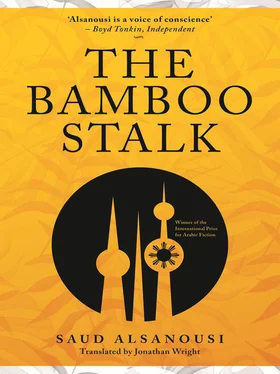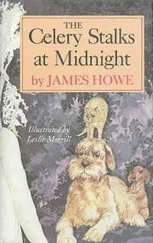* * *
Merla arrived three days after Grandfather died. The family had decided that his body should stay in the church for five days so that all the family members could see it before he was buried.
Merla came to the church with Maria, who sat in the back row near the door while Merla came forward to the front row. She greeted us and said, ‘I’m sorry to hear the news.’ Uncle Pedro made room for her next to me and she sat down.
The family members and the guests started to leave one by one and by sunset Merla and I were the only ones left inside. She turned to me and looked me in the face. ‘You hypocrite!’ she said. ‘Don’t pretend to be sad to lose him, José.’
I put my hand on her knee and looked towards the coffin where the body was lying. ‘In fact I am sad, Merla,’ I said. ‘I had never looked at his face till now.’ I squeezed her knee. ‘If I had seen him again before he died, I would have told him I forgive him.’
I took my hand off her knee. She stood up and walked towards the coffin. ‘What matters is that you’ve forgiven him. That’s up to you, not up to him,’ she said.
‘What do you mean?’ I asked. Her back was towards me and her face towards the coffin, which was just a few metres away.
‘We’re not rewarding others when we forgive them their sins,’ she said. ‘We’re rewarding ourselves. They call it catharsis.’
My silence didn’t mean I agreed with what Merla believed, but I wasn’t going to argue with someone crazy right now. I wanted Mendoza to be absolved of his sins against me before he was buried, and when he was absolved, I would have a clear conscience too.
‘Aren’t you going to have a last look at Mendoza, José?’ Merla asked, without turning towards me. Merla stepped towards the coffin and I followed with heavy feet.
The coffin was at the front of the church, open on a table covered with a piece of white silk. It was surrounded by white flowers in silver vases. The coffin was white with decorative touches in purple and golden handles on all four sides. There was a crucifix hanging above it on the wall. To the right there was a picture of Mendoza in a frame on a wooden stand and some basic information about him — Sixto Philip Mendoza, born 6 April 1925, died 21 June 2005, aged 80.
I stepped towards the coffin, where Merla was standing praying. Grandfather was lying under the glass cover with his eyes closed. His face was grey and the powder they had put on it didn’t hide the pallor. He looked respectable in a way he hadn’t looked when he was alive. He was wearing black trousers and a white shirt with vertical black stripes.
I looked at the inside of the coffin lid at the end where his head would be. My mother had attached strips of purple cloth to it, each with the name of a close family member: Aida, Josephine, Pedro and his wife and children, Alberto and Adrian, Merla and José. When the lid was closed the names would be on the ceiling of the coffin, in front of Mendoza’s face, so he would be reminded of his family in the other world.
‘Let’s go, José,’ said Merla. We crossed ourselves over the body and left him in the tranquillity of the church.
On the way home, I asked Merla to go on ahead. ‘I have something to do. I’ll join you later,’ I said.
I went back to the church. The man in charge had switched off the lights and was about to close up. I asked him for a little more time to pray for my grandfather. ‘I’ll be back in five minutes,’ he said. He went to a table, took a candle and lit it. He gave it to me before leaving.
Holding the candle I went to Grandfather’s body and looked at his face. His eyes, his nose, his lips and the other parts of his face all seemed to be moving because of the candle flame flickering in the dark. I turned to the coffin lid, reached out, and with my thumb and index finger I pulled off the strip of cloth that had my name on it.
‘Sorry, Grandfather,’ I said, looking at his face behind the glass. I closed the coffin lid and walked down the short corridor that led outside, with the candle in one hand and the strip of cloth in my other hand. ‘That way you won’t be reminded you have a grandson called José,’ I said to myself as I walked away, leaving the coffin behind me.
At the door I stopped and turned, facing the coffin. I rounded my lips to blow out the candle, confident that I would never again hear that call of Mendoza’s: ‘José, José, José.’
9
The White Rabbit appeared without warning five days after Mendoza died. Maybe it had been waiting for him to die.
I had been waiting a long time, rabbit, for you to appear in front of me. I would follow you, trip up and fall down a hole that leads to my father’s country. But apparently falling down a hole isn’t as easy as I imagined.
* * *
At noon on the fifth day after his death a luxury limousine, decorated with vast quantities of flowers, carried away the body of my grandfather Mendoza. He who had never travelled in such a car in his lifetime did so in death, on his journey to the cemetery near his piece of land.
The wheels of the limousine turned slowly. The family and the many other mourners walked behind it, carrying wreaths of flowers and umbrellas to keep off the sun, as they took Mendoza to his final resting place.
Meanwhile the White Rabbit was waiting for me somewhere, wearing his famous waistcoat, holding his pocket watch and counting the time.
A week before Mendoza’s funeral the White Rabbit had been at another funeral, saying his own last farewells to a friend, after a separation that had lasted fifteen years.
* * *
Mama Aida was at home. She hadn’t come to the burial with us. Although my mother and Uncle Pedro had tried to persuade her, she flatly refused to come. ‘As far as I’m concerned, my father died a long time ago,’ she said, ‘when we were children. The only new thing today is that you’re throwing his body in a dark hole like the hole he pushed me into when I was seventeen. Off you go and take the children with you.’
When the burial was over and we were together at home, Mama Aida said someone had called to ask after Mother. ‘I asked him to call back in two hours,’ she said. Right on time, the rabbit called.
‘Yes, I’m Josephine,’ my mother told the caller. She jumped to her feet in surprise. ‘How could I not remember you? Of course I remember you, Ghassan.’
Ghassan. The name hit me like an electric shock. My father’s friend. The fisherman. The soldier. The poet who played the oud.
The memories teemed in my head and all my senses came to life: the music I had heard in Boracay, the smell of fish and other disgusting smells, maybe the smell of the bait in the plastic bag that Walid was carrying in the old photograph.
As soon as my mother said the name Ghassan, I couldn’t help rushing upstairs to Merla’s room, where there was another telephone. I picked up the receiver and put it to my ear to hear their conversation — my mother and Ghassan.
‘I imagine it’s time for him to come back,’ said Ghassan in a rough voice that was nothing like that of a poet, maybe the voice of a soldier. ‘That’s what Rashid wanted, fifteen years ago,’ he continued.
My mother breathed faster when she heard my father’s name.
‘I asked Rashid to look after my mother if anything bad happened to me. In return he asked me to look after Isa if anything happened to him,’ said Ghassan.
‘Rashid? Something bad?’ my mother said, so quietly I could hardly hear her.
‘I had great hopes he’d be released from detention,’ said Ghassan, his voice gentler now and hesitant. ‘I’m sorry but. .’ he continued. The soldier’s voice was gone and he went on in the voice of a poet. ‘One week ago the Tarouf family received the remains of Rashid from a mass grave in southern Iraq.’
Читать дальше












